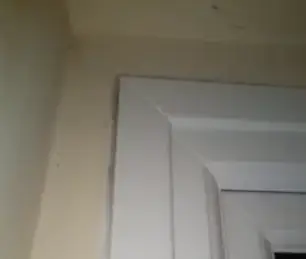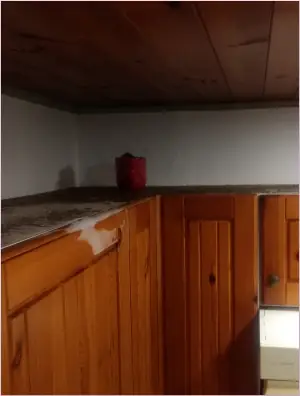last updated October 21st, 2025
Smells are one of the biggest turn-offs when viewing a home so it is worthwhile looking at the different causes of smells and how to get rid of them if you buy. Most are not dangerous and are easy to remove while some will require expert investigation.
Some smells are caused by increased humidity which can show on walls as stains or condensation on walls and windows - as water entering through walls (water ingress) is common, there is a detailed article at House Buyer Tips - Where to check for water damage and dampness in a home survey to read after you finish this page!

Damp or humid areas in the home such as bathrooms, basements and laundry rooms and bedrooms can develop mould and mildew very easily leading to a musty smell and white / black or reddish orange staining on cold surfaces which are often external walls. It can also enter the sealant around windows and baths if an anti-mould sealant was not used. Poor ventilation is the biggest cause - bathrooms should have ventilation fans and air must be allowed to circulate near walls and nearby furniture such as beds and sofas should be kept away from external walls if possible.
Windows should be opened daily to freshen up the air. Using chemical sprays to deal with mould does not stop the problem - it simply kills the mould for a few days until it grows again so you must deal with the root cause of the problem. If there are water leaks such as dripping gutters externally, you will eventually have damp spots on walls and mould on internal walls.

Cooking produces various smells and grease and food particles gather on and behind cookers, exhaust fans, on top of wall units, behind and in ovens and walls nearby. Exhaust fan filters are a common problem so bargain on replacing either the filter or the complete kitchen hood - there are specific kitchen paints that are washable so use these when repainting and do a complete cleandown of the kitchen including all presses inside and on top.
In short - Yes, sewer gases include hydrogen sulfide and methane with bacteria and they can be toxic at high concentrations. Most house sewer gases are however 'local' rather than coming from the main sewer so concentrations are lower.
Blocked or slow drains and sewage backups can cause sulphur or rotten egg like smells in a home. If a toilet bubbles' when you flush it and drains slowly, there is probably some sort of blockage. Firstly check the manhole on the property to see if it is blocked and see if any kitchen drain at the ground floor externally is spilling over. When you are buying a property, it is good practice to have the drains inspected.
If a smell is appearing in a bathroom or laundry and the toilet/bath/shower are emptying quickly, the problem may be a 'dry trap'. Under all sinks and baths / showers there is a trap which must have water in it at all times - if it dries out smells will come up from the drainage system. Sometimes, if a washing machine or dish washer is emptying, you may hear gurgling in a nearby sink and smells may appear. This is caused by the machine waste water vacuuming out the trap - fitting an 'anti-syphon' trap will resolve this problem.
Empty traps are a regular problem in houses where there are multiple bathrooms with one of the baths/showers used rarely - during a hot summer or when winter heating is on, the water in the trap evaporates and smells appear - just run a tap to fill it up again.

The waste pipe from these will be connected to the main drain but often it is not done with a trap (as explained above) present so gases enter. The solution is to have a trap fitted or pipe into an existing trap under a sink for example.
Sometimes described as a fish smell, a burning smell in a home can be a sign of electrical problems such as faulty wiring or overheating equipment in the kitchen. Burnt plastic or rubber smells should never be ignored as they may indicate a fire hazard. An electrical inspection is worthwhile to resolve the problem.
Pets can bring strong lingering smells and accidents on carpets or furniture can lead to strong odours. Fleas can also be present so best to have a full clean out. The smells will mainly be in furniture and carpets so if you are not buying these with a home, the problem may go when the house is cleared out.
Air conditioning is becoming increasingly popular even if only used in a few rooms. Filters in air conditioners clog up with dirt and eventually give off a 'dirty sock' smell which is very distinctive. The filters must be cleaned and/or replaced - always check that the air conditioning system has been maintained when inspecting a property.
Sometimes, you will just discover a smell lingering in the air and impossible to locate to a specific room. If this happens it may be that the house is located near a refuse dump, a sewage treatment plane, a food/chemical factory, a carwash or a brewery and the smell may vary on time of day or season or floor of the house. Ask a few neighbours nearby to try and locate the source. If the smell appears to be coming from the ground, get further advice as it may be a 'recovered' industrial site as discussed at Radon Gas and Hidden Environmental Risks - Test your house for radon. Radon Gas does not smell and is detected by other means.